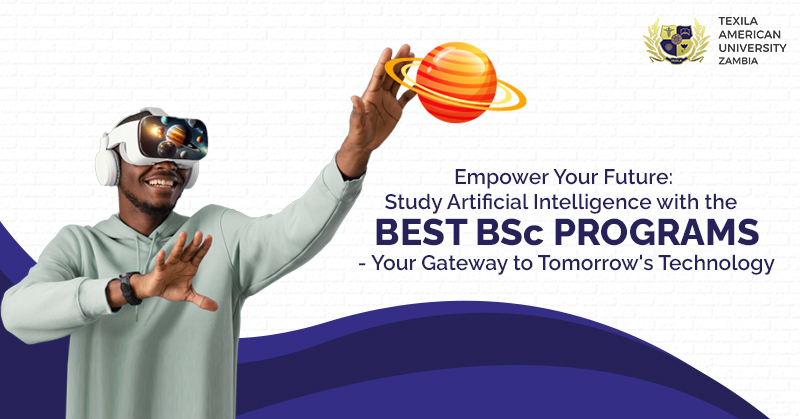|
Tired of Reading? Please listen to the blog
|
Blog Summary
Embark on a transformative journey to study artificial intelligence with a Bachelor of Science in Artificial Intelligence (BSc AI). Explore leading AI programs, grasp career opportunities, and engage in practical applications. BSc AI facilitates interdisciplinary learning, empowering individuals to innovate across diverse industries. Explore how AI education can shape your future, unlocking boundless potential and contributing to technological advancements. Delve into the dynamic realm of artificial intelligence, where every discovery leads to new horizons and endless possibilities await.
- I. Introduction
- II. Understanding Artificial Intelligence Degree Courses
- III. Navigating Bachelor of Science in Artificial Intelligence Programs
- IV. Choosing the Right Bachelor of Artificial Intelligence Program
- V. Steps to Study Artificial Intelligence
- VI. Trending Topics and Technologies in Artificial Intelligence
- VII. Expert Insights on Studying Artificial Intelligence
- VIII. Future Outlook: Bachelor of Science in Artificial Intelligence
- IX. Conclusion
- FAQs
I. Introduction
In today’s rapidly evolving technological landscape, the importance of artificial intelligence (AI) cannot be overstated. Pursuing a Bachelor of Science in Artificial Intelligence (BSc AI) opens doors to many opportunities in various industries, revolutionizing how we live and work.
A. The Rise of Artificial Intelligence
In recent years, we have witnessed a remarkable surge in the prominence of artificial intelligence (AI), which has impacted various aspects of daily life. According to a report by Grand View Research, the global AI market size is expected to reach USD 733.7 billion by 2027, indicating the escalating demand for AI expertise. Its rapid advancement has led to unprecedented opportunities and challenges, shaping the future of industries and societies worldwide.
B. Importance of Pursuing BSc Programs in Artificial Intelligence
With the demand for AI expertise rising, pursuing a BSc in Artificial Intelligence equips pupils with the knowledge and skills needed to thrive in this dynamic field. This guide explores the intricacies of AI degree courses, highlighting top programs and paving the way for rewarding careers.
II. Understanding Artificial Intelligence Degree Courses
A. Exploring the Best Artificial Intelligence Course
Choosing the right AI course is crucial for laying a strong foundation in this rapidly evolving field. The best artificial intelligence course blends theoretical concepts with practical applications, offering comprehensive understanding and preparation for real-world challenges.
B. Key Features of the Best Artificial Intelligence Program
Top artificial intelligence programs encompass many subjects, providing hands-on experience and fostering critical thinking, creativity, and ethical considerations. Graduates are equipped to handle the complexities of AI technologies responsibly.
C. Benefits of Pursuing a BSc in Artificial Intelligence
Earning a BSc in Artificial Intelligence offers numerous benefits, including exciting career opportunities, job security, and competitive salaries. Graduates can contribute to groundbreaking projects and innovations across industries.
III. Navigating Bachelor of Science in Artificial Intelligence Programs
A. Overview of BSc in Artificial Intelligence
A Bachelor of Science in Artificial Intelligence combines computer science, mathematics, engineering, and cognitive science, offering comprehensive education in AI fundamentals and advanced topics.
B. Curriculum Highlights of Bachelor of Science in Artificial Intelligence
The curriculum includes core courses in AI principles, algorithms, and techniques and elective courses for specialization. Hands-on experience and interdisciplinary learning prepare students for diverse career paths.
C. Career Prospects with a Degree in Artificial Intelligence
Graduates can pursue roles as AI engineers, data scientists, research scientists, AI consultants, and more, contributing to transformative projects and innovations worldwide.
IV. Choosing the Right Bachelor of Artificial Intelligence Program
A. Factors to Consider When Selecting a BSc Program
Key factors include curriculum, faculty expertise, research facilities, industry partnerships, alumni network, and career support services. A study by Burning Glass Technologies reveals that AI-related job postings have increased by 74% annually, emphasizing the importance of aligning educational choices with industry demands and ensuring alignment with academic interests and career goals.
B. Comparing Different Bachelor of Science in Artificial Intelligence Programs
Research and compare programs based on accreditation, faculty credentials, course offerings, facilities, internship opportunities, and alums outcomes to make informed decisions.
C. Testimonials and Success Stories from Alumni
Alumni insights provide firsthand accounts of academic experiences, career trajectories, and skills acquired during studies, inspiring prospective students and offering valuable perspectives.
V. Steps to Study Artificial Intelligence
A. Preparing for Admission into BSc Programs
Research admission requirements and focus on building a solid foundation in mathematics, programming, and computer science to enhance eligibility and readiness for BSc programs.
B. Strategies for Success in Bachelor of Science in Artificial Intelligence
Studies Engage in lectures, workshops, class discussions, projects, and extracurricular activities to excel in studies. Stay updated on developments in the field and seek mentorship from faculty members.
C. Resources and Tools for Studying Artificial Intelligence
Utilize online platforms, open-source libraries, academic journals, online forums, and professional associations to access courses, tutorials, datasets, tools, insights, discussions, and networking opportunities.
VI. Trending Topics and Technologies in Artificial Intelligence
A. Current Trends Shaping the AI Landscape
Emerging trends include deep learning, autonomous systems, the democratization of AI, and integration into various domains, which are driving innovation and societal impact.
B. Emerging Technologies in Artificial Intelligence
Technologies such as reinforcement learning, generative adversarial networks, transfer knowledge, and quantum computing hold promise for advancing AI capabilities and solving complex problems. The International Data Corporation (IDC) forecasts that AI spending will surpass $500 billion by 2024, underscoring AI’s pivotal role in reshaping various sectors.
C. Impact of AI on Various Industries
AI is transforming change in healthcare, finance, transportation, education, agriculture, manufacturing, and entertainment, reshaping the future of work and society.
VII. Expert Insights on Studying Artificial Intelligence
A. Perspectives from Industry Leaders and Experts
Industry leaders emphasize interdisciplinary collaboration, creativity, problem-solving, and lifelong learning, highlighting AI technologies’ ethical considerations and societal implications.
B. Advice from AI Professionals and Academics
AI professionals recommend gaining hands-on experience, building a professional network, staying updated on developments, and developing communication, teamwork, and leadership skills for success in AI careers.
C. Success Stories and Career Pathways in Artificial Intelligence
Alumni success stories showcase diverse career opportunities, from founding startups to leading research teams, driving innovation and creating positive change in the world.
VIII. Future Outlook: Bachelor of Science in Artificial Intelligence
A. Emerging Trends in Artificial Intelligence Education
Education trends focus on innovation, accessibility, and inclusivity, incorporating emerging technologies and ethical considerations to prepare students for meaningful careers in AI. As we look toward the future, it’s evident that AI education will continue to evolve. The World Economic Forum highlights the importance of AI literacy in the workforce, projecting that AI will create 97 million new jobs by 2025.
B. How BSc Graduates in Artificial Intelligence are Shaping Tomorrow’s Technology
BSc graduates drive innovation in AI research, development, and deployment, contributing to transformative solutions and impacting industries, communities, and individuals worldwide.
C. Opportunities and Challenges in the Field
AI offers abundant opportunities for growth and innovation. However, it also poses difficulties related to bias, fairness, transparency, privacy, and accountability that require collaborative efforts to address responsibly.
IX. Conclusion
Pursuing a Bachelor of Science in Artificial Intelligence empowers pupils to shape the future of technology and society. By gaining a deep understanding of AI principles, techniques, and applications, students unlock endless opportunities for innovation and impact. Embrace the challenge, pursue your passion, and embark on a fulfilling career in AI. Start your journey today and empower yourself to shape tomorrow’s technology.











